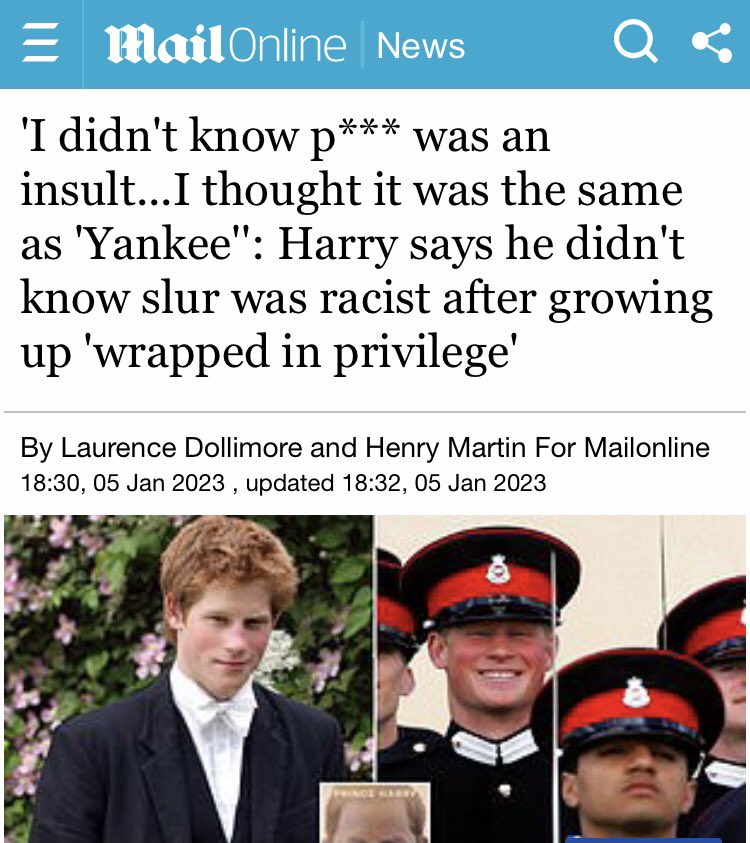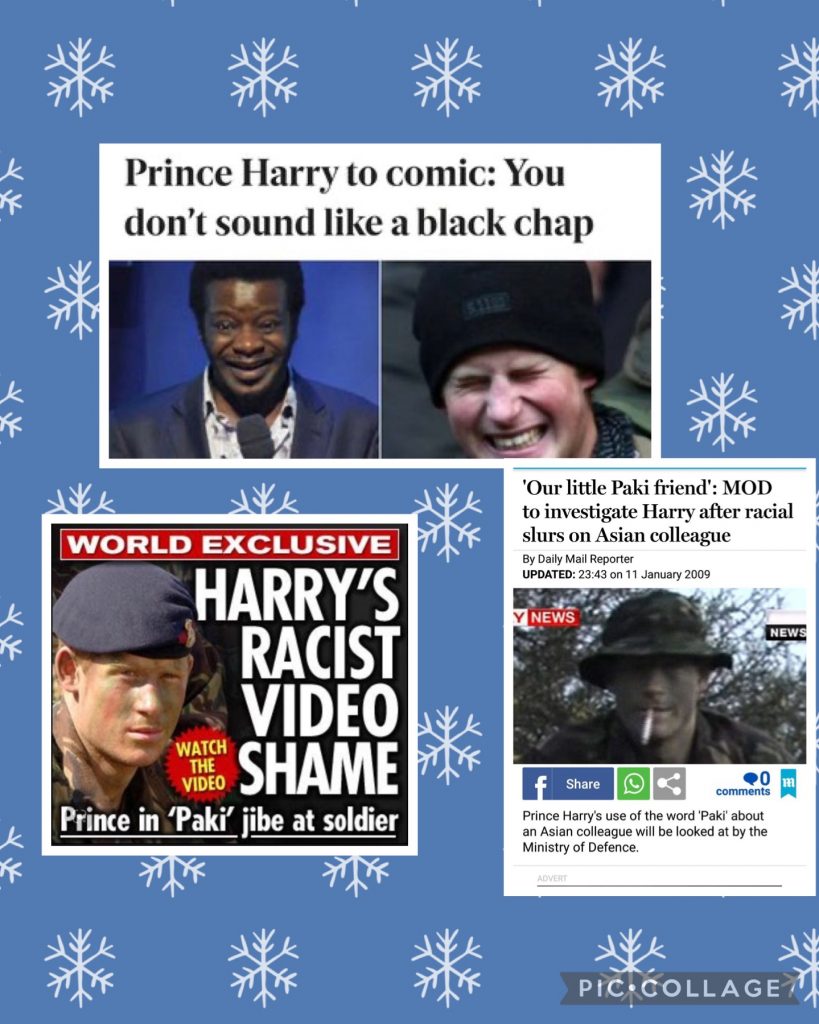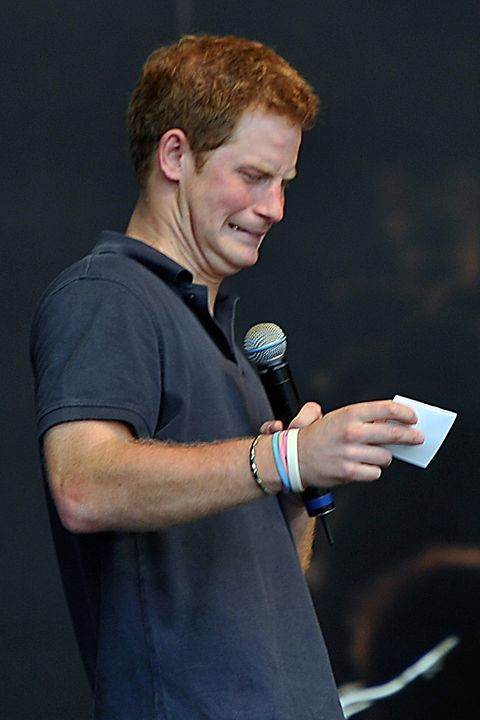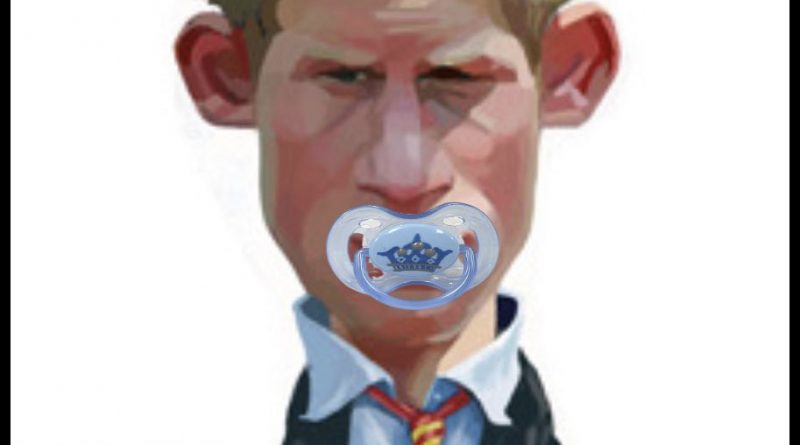Monday memory: The prince and the paki
(Credit to The Wanton Wench on Twitter for the cover image)
‘Paki!’
I had barely noticed the young man walking towards me.
He doesn’t stop as he approaches. He just looks at me from under his eyelashes, says the word and continues walking. He’s like the neighbour who wishes you a breezy “morning“ of acknowledgement as he passes on his way to the car.
I’m 19 and the young man looks two or three years older than me. He’s dressed in the uniform of most young men I see, jeans and a leather jacket. He doesn’t even look angry when he says the word. His mouth is not contorted with hatred in the way some I’ve seen when they spit it out. He sounds almost weary, like it’s something he’s got to do and get over with. There’s a tiredness about the energy he puts behind it.
Our eyes meet for a brief second and then we pass on. We both have somewhere else to be.
Sticks and stones will break my bones but words will never hurt me.
But words do hurt. They sting parts of you that physical hurt can’t reach. They go to your sense of being, your self worth, your self regard. A psychologist might say they become ‘internalised’ over time and reflect back to you what others see because, deep down, it’s what you see yourself as.
A racial slur when you are a minority immediately ‘others’ you. It tells you that you don’t belong in the pack, that you are different, that you are less than. If you hear it often enough it can become part of you until you see yourself as less than others.
Intellectually you can understand that racism is wrong and that you have as much right as anyone else to be exactly where you are in the world but in some crevice of your mind it lays there, slowly poisoning your blood. It can affect your behaviour – you constantly try to please, you put yourself second, you don’t reach for the goals you really want. You accept poor treatment because part of you has bought into the perception of yourself as an outsider, a burden, an unwanted being.
Old style divorce petitions used to argue that a marriage had ‘irrevocably broken down ‘ because the husband called his wife names such as ‘slut’ or ‘whore’. Or the wife called her husband ‘weak’ or a ‘wimp’. And this adversely affected the spouse’s self-esteem.
To the outsider it may not seem the strongest ground for ending a marriage. It wasn’t adultery or physical violence but to the petitioner it was the constant drip, drip, drip erasing of their very being.
So, the impact of words that harm can be lifelong. They can cut a jagged hole in you from which so much of your identity can seep out that it’s hard to pull it back in. It can take years of self reflection and honesty with yourself to heal it.
*
Still, most of these ever changing terms are better than ‘Paki’ which many brown skinned people will have been called at some point, whether their parents hailed from Pakistan, Morocco or Guatemala.
In the early 1970’s, ‘if you want a Paki for a neighbour, vote labour,’ was an unofficial slogan that received some sympathy. Going down to the Paki shop was an accepted term of speech for some people.
In the early years of my practice when I practiced criminal law, police officers routinely asked me what a nice girl like me was doing representing a ‘Paki’.
Then, in June 2003 the High Court ruled that Paki is an ‘offensive, derogatory term used by racists, often as a prelude to violence.’
Those of us who have had the word hurled at us from mouths contorted by hatred could have told you that for nothing but if it takes a High Court ruling to ram the point home, then so be it. At least it’s official now.
‘Paki’ is historically and still today, primarily an insult. Despite the efforts of the cool young things, it’s on a par with ‘Kike’ or ‘coon’ as something you don’t say without running the risk of a retaliatory punch in the mouth.
So, the ruling by the High Court was an interesting development. The court case involved a football fan taunting opposing fans for being from ‘a town full of Pakis.’ The magistrate hearing the case acquitted the man of an offence of using racially offensive language saying, that, referring to Pakis was ‘no more insulting than using terms such as Brits, Kiwis or Aussies,’
It would be nice to live in the world of that magistrate where that were so. But since he sits in Stoke, not Utopia, he really should have known better.
Young men of a certain disposition do not use the term ‘Paki’ as polite shorthand for ‘resident of Pakistan.’ They use it with ferocity to express their hatred of people with brown skin. It matters little to them whether the brown person is indeed from Pakistan or from India, Iraq, Turkey or somewhere east of Austria.
There are more Indians in Britain than Pakistanis but let’s disabuse ourselves of any notion that racists differentiate. When a yob spits out Paki at a Sikh or a Morrocan, is he really using the term as he might do ‘Aussie?’
Of course not and the High Court recognized this. Edward Coke, the barrister who appealed the decision is a former head of my chambers. He submitted to the court that Paki was no ‘mere trivial phrase.’ He drew the court’s attention to the ways in which the term is usually employed; as a description of violence- ‘Paki bashing.’ As a means of making immigrants unwelcome – ‘Paki go home.’ As an insult – ‘f****** Paki’ and so on.
It is the negative history of the term in Britain which makes it an offensive word not the word per se. So, for the foreseeable future, its use, even by street-smart kids will continue to be unpleasant.
As that great fictional lawyer Atticus Finch might have said, “Don’t say Paki, Scout. It’s common. Just one of those terms that ignorant, trashy people use when they want an ugly term to label somebody.”
*




Not long after the story which led to the High Court ruling was in the media, up popped a video featuring Prince Harry. He was aged 24 and was caught on film using racial slurs such as ‘paki’ and ‘rag head.’ It was one of a series of race related Harry incidents that made headlines. He famously wore a swastika uniform. Reportedly said his girlfriend Chelsy Davey ‘was not black or anything’ because she was from Botswana. Told a black comedian he didn’t sound black and so on.
I was commissioned to write an article about the video. To my recollection, Harry has never personally apologised for it. The palace PR issued a formal statement at the time. The men in grey, then worked full-time to polish his public image. Soon, Harry the cheeky chappie was everywhere. We were to forget yobbish Harry.
Many did.
Not everyone though.
On the night Harry and Meghan’s poison-fest with Oprah aired, my phone lit up like Las Vegas where Harry had once been filmed prancing around butt naked.
It was people from the large database I have of those I contact for their views if I’m contributing to the BBC or the press. Many on the data base are of South Asian origin. On this night they were contacting me to share their disgust at the tacky show. They had expected some juicy gossip, some snigger worthy laughs but this was betrayal of family and that was cheap and despicable.
They had watched Harry, slack jawed and dead eyed, sitting beside Markle while she attacked HIS family with accusations for which she provided not a shred of evidence and they were turned off.
In conversation many also referred back to the Paki video. I was surprised at the emotional charge it still held for them, years later.
I’m currently in the USA and haven’t asked them what they think of Harry now trying to weasel his way out of responsibility for his own words (just as he refuses to take responsibility for anything he’s ever done as his carefully crafted image spectacularly and grotesquely unravels with a nasty book full of envy and jealousy of his brother). He is claiming he didn’t know Paki was an offensive term. Even given his widely reported stupidity that is hard to believe. (It’s hard to believe any of his and Markle’s vague, contradictory and nonsensical accusations, especially since there’s photographic and video evidence to refute them but this takes the biscuit).
So, it’s interesting to note how easily people on platforms such as Twitter downplay the incident. He was young, they shrug (he was in his 20s), not interested in any hurt British Asians might have felt or still feel. In their hierarchy of victimhood most Asians don’t play the victimhood ball hard enough to count.
At the time I wrote the original article, a black barrister from Ghana commented that it was more measured and lenient than Harry deserved.
I hadn’t intended to be lenient. I knew that people were privately hurt a public figure would use such a term so easily. Harry wasn’t a royal they admired but he had an international platform, access to the finest guidance on good manners, refined language and respect for others from a position of unmatched privilege. It wasn’t a good look.
But I also knew that the Asians in my database didn’t want to be defined as victims. They wanted to make their way in Britain with dignity and their innate self pride intact.
In this respect second and third generation British Asians learnt much from their parents. That first generation often faced open hostility, blatant discrimination and sometimes unfiltered abuse but they held their heads high and focused instead on all the opportunities Britain offered them. They went from labouring on the factory floor for 16 hours a day and living 7 to a room in rented accommodation, to businesses and enviably comfortable lives. Some built huge business empires. Many raised children who would go on to join the most prestigious professions in the country.
It isn’t that British Asians aren’t hurt and humiliated by bigotry and prejudice. They just don’t want to be defined by it.

